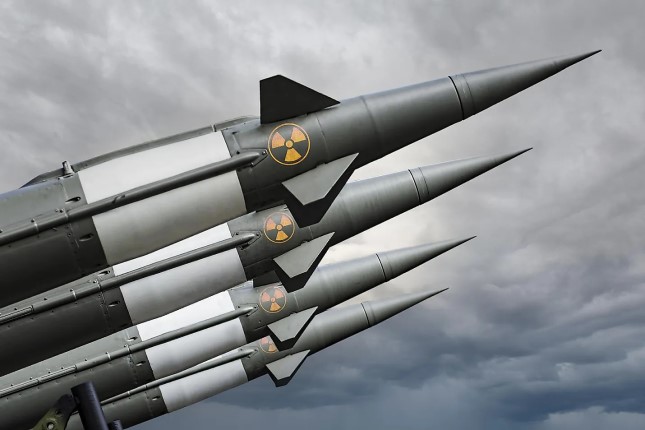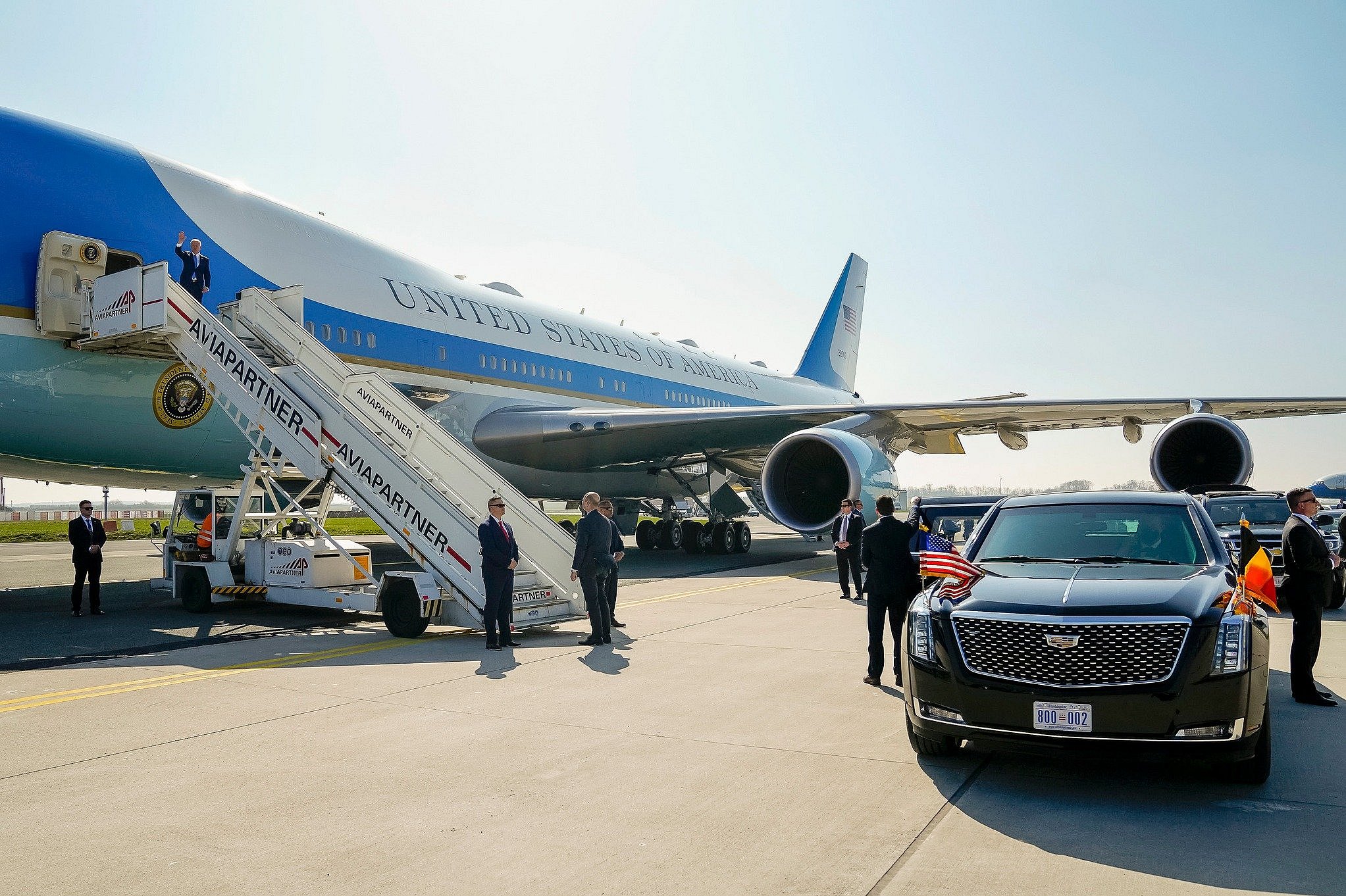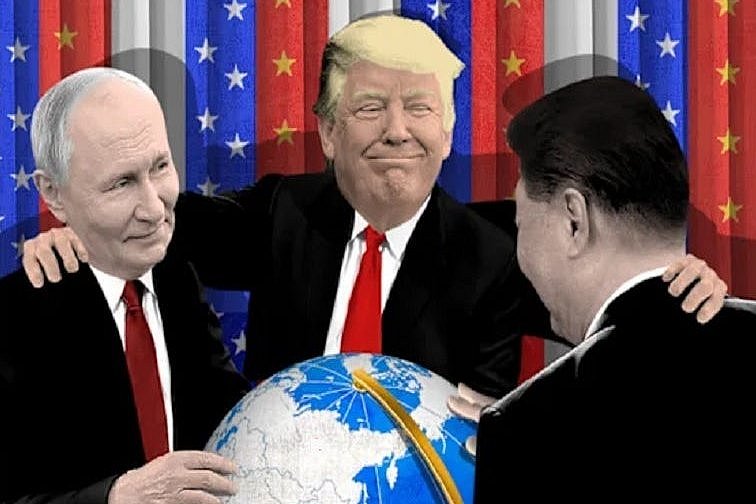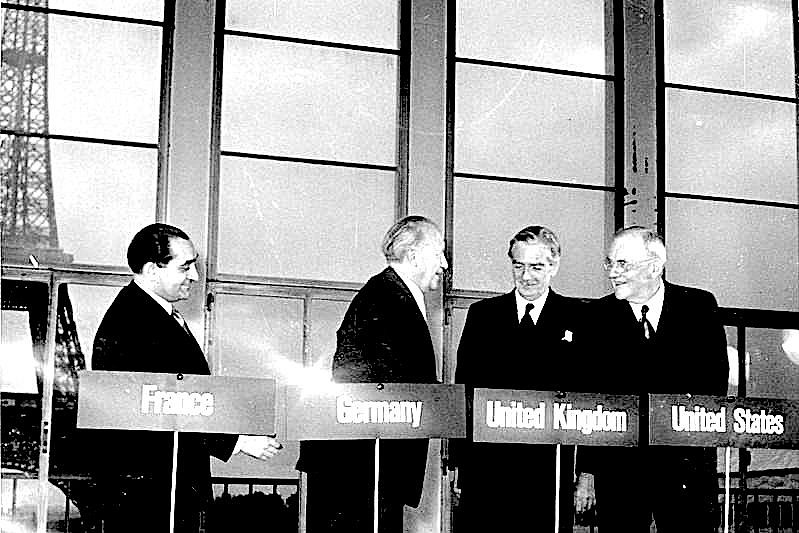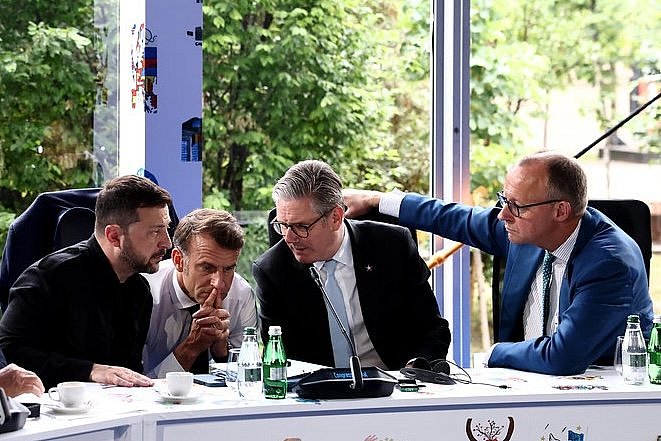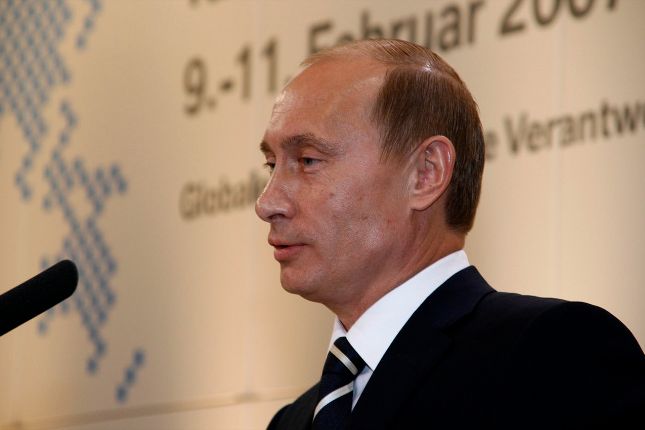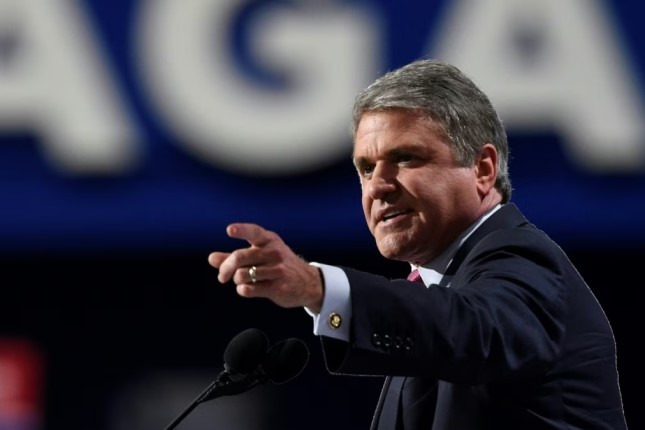The United States finds itself wandering in a wilderness of indecision when it comes to arms control policy.
The situation regarding the status of the last existing nuclear arms control treaty with Russia — the New START treaty — is dire. Implementation is currently frozen after Russia suspended its participation in protest to a stated U.S. policy objective of seeking the strategic defeat of Russia, something Russia finds incompatible with opening its strategic nuclear deterrent (which exists precisely to prevent Russia’s strategic defeat) to inspection by U.S. officials.
The U.S. is not talking with Russia about the future of arms control once New START expires in February 2026.
Moreover, fallout from the U.S. policy of seeking strategic defeat of Russia has seen Moscow radically alter its position regarding future arms control treaties. Any future agreement must, from the Russian perspective, include missile defense; the French and British nuclear arsenals, as well as the U.S.-supplied NATO nuclear deterrent.
Russia has further complicated any future negotiations by deploying tactical nuclear weapons to its Baltic enclave in Kaliningrad, as well as extending its Russian-controlled nuclear umbrella to Belarus where it has mirrored the NATO nuclear umbrella.
The state of play today regarding strategic arms control between the U.S. and Russia can best be likened to a patient on life support whom no one is trying to revive.
Russia is in the process of finalizing a major modernization of its strategic nuclear forces, built around the new Sarmat heavy intercontinental ballistic missile (ICBM) and the Avangard hypersonic reentry vehicle. The United States is on the cusp of initiating its own multi-billion dollar upgrade to the U.S. nuclear Triad consisting of the B-21 stealth bomber, the Columbia class missile submarine and the new Sentinel ICBM.
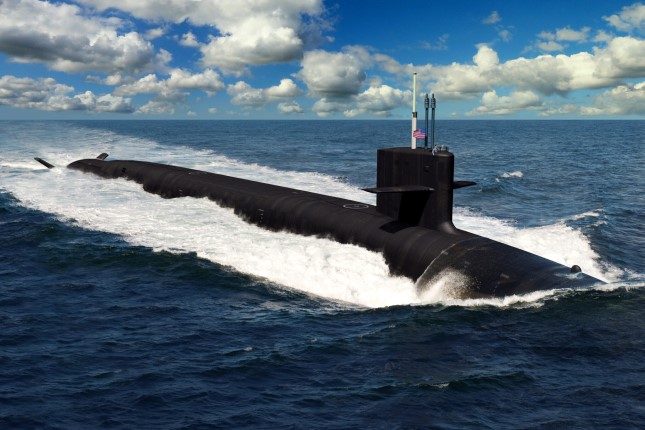
An artist rendering of the future U.S. Navy Columbia-class ballistic missile submarines. Photo: U.S. Navy / Wikimedia Commons.
If no treaty vehicle exists designed to verifiably limit the deployment of these new weapons, once New START expires, the U.S. and Russia will find themselves engaged in an unconstrained nuclear arms race that dramatically increases the probability of unintended nuclear conflict.
When viewed in this light, the future of global security hinges on the ability of Russia and the U.S. returning to the negotiating table and resuscitating arms control from its present moribund state.
Key to this will be the willingness of Washington to incorporate Russian concerns into U.S. nuclear posture. To achieve this, the U.S. nuclear establishment will have to be shaken out of the calcified policy assumptions that have guided U.S. arms control policy since the end of the Cold War.
First and foremost amongst these assumptions is the need to promote and sustain U.S. primacy in global nuclear weapons capability. Whether such an assumption is jettisoned will be tied to the person occupying the White House after the February 2026 expiration of New START.
This makes the 2024 U.S. presidential election one of the most critical in recent history. Simply put, the future of humanity may ride on whomever the American people vote for in November 2024.
The Establishment Standard
President Joe Biden has indicated that he will be seeking a second term in office. While some have opined that, given Biden’s age, this goal might be too optimistic, the reality is that if Biden, Vice President Kamala Harris, or some other person designated by the Democratic Party is in office to continue the Biden administration’s agenda for another four years, decisions on the future of the U.S. nuclear posture and, by extension, arms control policy, will remain in the hands of the same establishment that has put us in the situation we are in today.
It’s proper to ask, therefore, whether or not the “establishment” is capable of implementing the changes necessary to get U.S.-Russian arms control back on track. History suggests not.
Biden ran in 2020 on a promise to change U.S. nuclear strategy away from the George W. Bush-era policy, when preemptive U.S. nuclear strikes were a possibility, to a doctrine holding that U.S. nuclear forces exist for the sole purpose of deterring a nuclear attack against the U.S., or retaliating if deterrence failed.
However, once elected Biden’s promise fell to the wayside as an “interagency process” run by unelected bureaucrats and military officers intervened to prevent campaign rhetoric from becoming official policy.
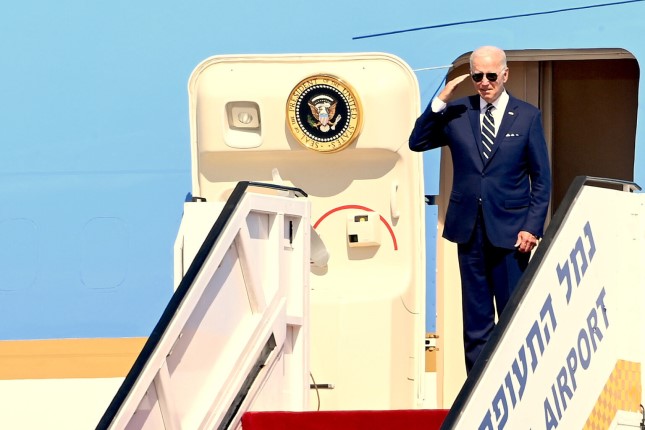
U.S. President Joe Biden in Israel, July 2022. Photo: U.S. Embassy Jerusalem, Flickr, CC BY 2.0.
Biden, like every American president before him in the nuclear age, has been unable and/or unwilling to expend the political capital necessary to take on the American nuclear enterprise, and as a result the American people and the rest of humanity are held hostage by this deadly nexus between the U.S. military industrial complex and the U.S. Congress.
Congress allocates taxpayer money to underwrite a nuclear weapons-oriented, defense industry, which in turn feeds this money back into campaign contributions that empower a compromised Congress to keep funding the nuclear enterprise – creating a vicious cycle impervious to change of its own volition.
Biden or anyone Democratic candidate in 2024 is a byproduct of this very establishment, and a willing participant in the corrupt circle of money and power that is the nuclear, military industrial-congressional complex. In short, if Biden or his proxy is sitting in the White House in 2025, there will be no change in the U.S. nuclear posture on arms control policy.
This means any Democratic Party-controlled candidate voted into office in November 2024 may very well be the last president to hold office, given the probability of nuclear war between the U.S. and Russia, which an unchanged nuclear posture and arms control policy will foster.
The Trump Standard
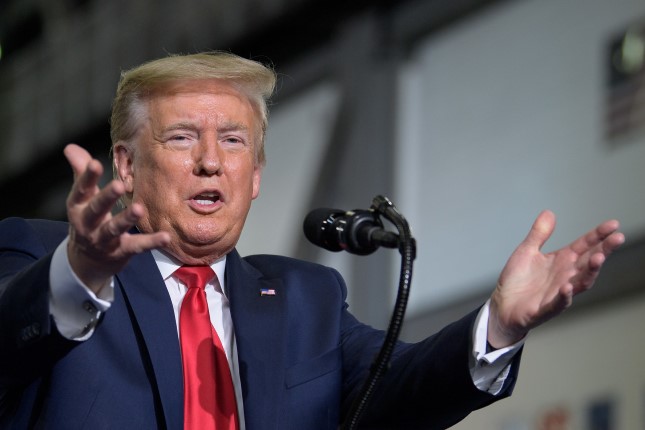
U.S. President Donald Trump speaking after the launch of NASA’s SpaceX Demo-2 mission with NASA astronauts Robert Behnken and Douglas Hurley onboard, May 30, 2020, at the Kennedy Space Center in Florida. Photo: NASA / Bill Ingalls.
Donald Trump, who preceded Biden as the occupant of 1600 Pennsylvania Avenue, has thrown his hat into the 2024 presidential race.
Given the current state of the Republican Party, which has been cowed into submission to Trump’s “make America great again” brand of populist politics, it’s highly unlikely the GOP will put up a primary candidate capable of defeating Trump, his ongoing legal dramas notwithstanding.
Whether Trump could pull off a second successful presidential run is not the issue here. Instead, the question is whether Trump can promote an arms control stance different from Biden and the Democratic and Republican establishments that could break free of existing constraints — giving arms control a chance.
Trump’s track record is decidedly mixed in this regard. On the one hand, he has articulated some foundational beliefs which, if incorporated into official U.S. policy, could radically alter the way the U.S. relates with the rest of the world and, in doing so, create a new paradigm capable of sustaining a revised arms control policy.
Trump’s willingness to break free of the ideological prison of rampant Russophobia by considering the possibility of friendly relations between the U.S. and Russia makes him unique among mainstream presidential candidates of either party.
Likewise, Trump’s questioning of NATO’s viability and purpose means that a future Trump administration could engage in the kinds of policy restructuring that ends the perpetual state of tension between NATO and Russia since NATO needs a Russian threat to justify its existence.
NATO’S diminishment as a policy driver would free both the U.S. and Europe to more rationally explore the potential for a new European security framework in a post-Ukraine conflict world. Such a posture would, in one fell swoop, help resolve many of the add-on issues Russia now insists must be part of any future U.S.-Russian arms control agreement, including missile defense, French and U.K. nuclear weapons and the U.S.-provided NATO nuclear deterrent.
More important, however, is Trump’s proven track record in breaking free of past policy precedent in pursuit of meaningful nuclear disarmament.
The case of North Korea stands out. Trump met with North Korean leader Kim Jung-un on three separate occasions to try to bring about the denuclearization of North Korea. While ultimately this gambit failed, in large part because of the resistance to change on the part of establishment figures like Trump’s secretary of state, Mike Pompeo, and National Security Advisor John Bolton, the fact that Trump even went down that path shows that, unlike his predecessors and successor, he was willing to go the extra mile in pursuit of ground-breaking change in U.S. arms control policy.
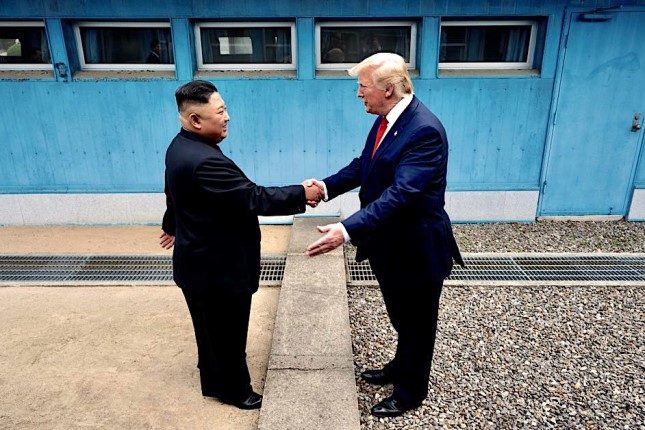
July 1, 2019: President Donald Trump and North Korean leader Kim Jung-un just before Trump became first U.S. president to step on North Korean territory. Photo: White House.
But there is another side to Trump which bodes poorly for any meaningful change in U.S.-Russian arms control. First and foremost is his abysmal record on arms control.
He withdrew from the Iran nuclear deal, he withdrew from the Intermediate Nuclear Forces treaty and he published as policy the most aggressive nuclear posture document in recent history, one which, according to Trump officials, was designed to “keep the Russians guessing” as to whether the U.S. would preemptively use nuclear weapons.
Trump refused to meaningful engage with the Russians on any aspect of arms control, and instead embraced the modernization of U.S. strategic nuclear forces. In short, there was no light between Trump’s arms control policy and that of the “establishment.” Indeed, one might make the case that Trump’s policies represented an escalation over the norm.
Then there is Trump’s tendency toward pugilistic bluster driven, apparently, by some inner insecurity that requires any U.S. negotiating position to be taken from a posture of overwhelming strength and dominance. He spoke of being “friends” with Russia, only to openly brag about being the “toughest president ever” when it came to sanctioning Russia.
He withdrew from the Iran nuclear agreement, imposing new sanctions, all the while promoting the idea of a new negotiation that would resolve the Iran nuclear issue. And his North Korean initiative included some of the most war-like rhetoric uttered by an American president in the nuclear age, promising “fire and fury” if North Korea failed to toe the line.
The bottom line is that the “Trump Standard” for arms control is in many ways even more dangerous than that of the “establishment,” promoting as it does an aggressive posture founded in dominance.
In the end, Trump proved incapable of acting on his own belief, allowing himself to be subordinated to a radical America-first national security ideology which promoted the enhancement and expansion of the American nuclear enterprise — the exact opposite trajectory the U.S. needs to be taking come 2024.
There is no reasonable expectation that a second Trump term would deviate meaningfully from that track record.
A New American Standard in Arms Control
The harsh reality today is that neither of the two potential sources of viable presidential candidates for the 2024 election — Democratic National Committee or MAGA Republicans — are positioned to effect meaningful, positive change regarding either U.S. nuclear posture or underlying arms control policy.
That leaves the American people, and the world as a whole, with the inevitability of a massive nuclear arms race between the U.S. and Russia, which will unfold unconstrained by meaningful arms control treaty-mandated limitations.
This is nothing short of a recipe for disaster, a witch’s brew of ignorance-based fear magnified by the lack of inspections designed to mollify concerns over the respective nuclear threats posed by two nations no longer willing to engage in meaningful dialogue and, as a result, perched on the precipice of an apocalyptic abyss.
In short, a vote for either Biden/the Democratic establishment or Trump/MAGA Republicans is a vote in favor of continuous nuclear-armed Russian roulette, where there exists only one certainty — eventually the pistol will go off. But in this case, it’s not a pistol, but a nuclear weapon that leads to general nuclear war and the termination of life on planet earth as we currently know and understand it.
The rally held in Washington, D.C., on Feb. 19 provided a platform for some voices of sanity who have presidential potential, either as independent candidates, or rogue outliers within their respective party establishments. Tulsi Gabbard, Dennis Kucinich, Ron Paul, and Jimmy Dore all addressed the threat posed by nuclear weapons and the need to control them through meaningful arms control.
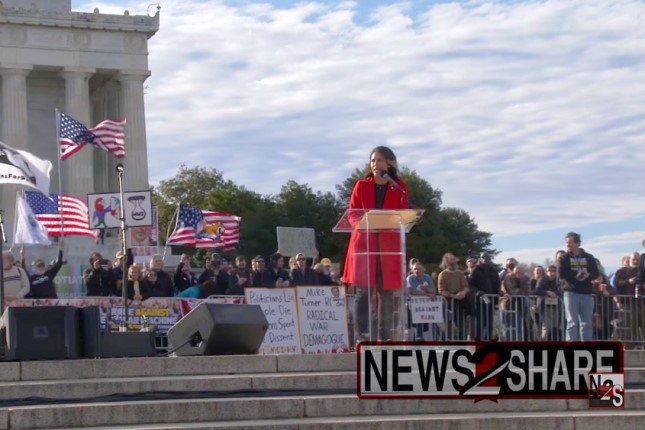
Tulsi Gabbard at Feb. 19 anti-war rally in Washington. Photo: News2Share screenshot.
But none who spoke have put anything in writing that would remotely constitute an arms control “standard” that could compete with either Biden or Trump — or their proxies — on the public stage. Moreover, other than Dore, a comedian, none of these individuals has announced an intention to run, making moot, for the moment at least, the notion of a third option on arms control and American nuclear posture.
Robert F. Kennedy, Jr., the nephew of former President John F. Kennedy, has announced his intention to challenge Biden for the Democratic nomination. While Kennedy, at this juncture, appears to be a long-shot, the likely mental and physical deterioration and possible incapacitation of Biden between now and November 2024, combined with the inadequacy of Vice President Kamala Harris as a presidential candidate, means the Democratic field could be thrown open.
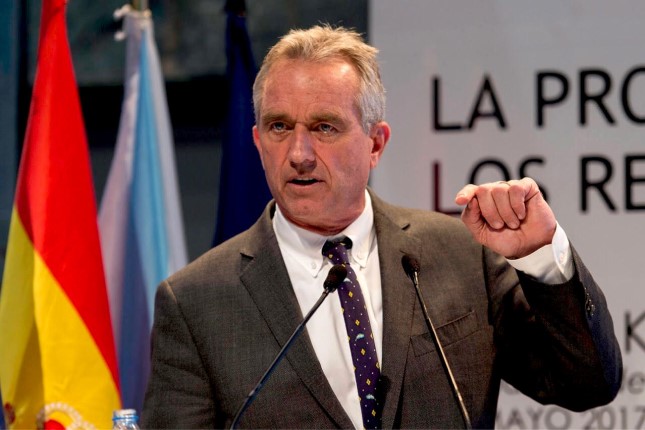
Robert F. Kennedy, Jr., in 2017. Photo: Maxlovestoswim/ CC BY-SA 4.0, Wikimedia Commons.
Kennedy’s announcement puts him in position to be either the candidate himself, or to challenge whatever establishment figure the Democratic Party selects for the job.
The question is whether Kennedy is willing or able to articulate a new American standard on arms control, one that embraces the best of the Trump Standard without the pugilistic arrogance Trump brings with it.
Kennedy has not published a detailed position on arms control and the U.S. nuclear posture. But in a recent conversation with me, he spoke about the legacy of his uncle, Jack Kennedy, and how he took guidance from that legacy.
Any man who draws upon the wisdom and patience displayed by President Kennedy to defuse the Cuban Missile Crisis would be on the right track when it comes to arms control.
Source: Consortium News.
